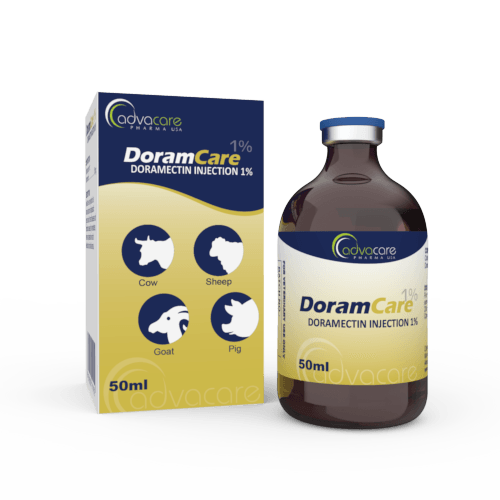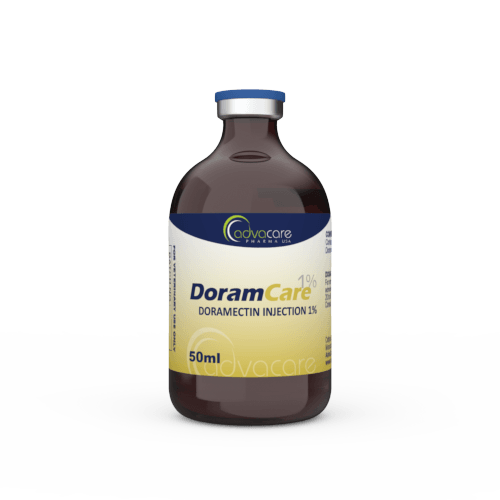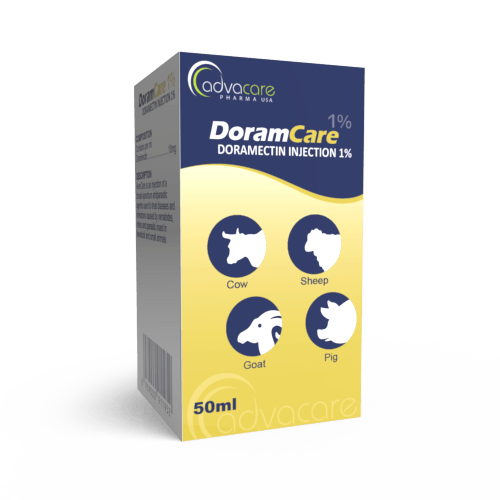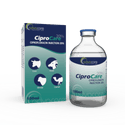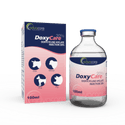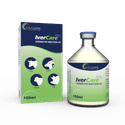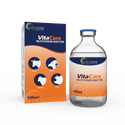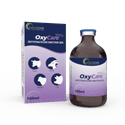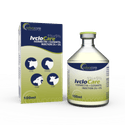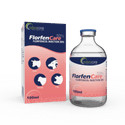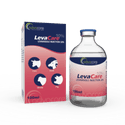- Home›
- Veterinary Pharmaceuticals›
- Veterinary Injections›
- Veterinary Liquid Injections›
- Doramectin Injection
Doramectin Injection
Dosage
Packaging
What is Doramectin?
Active Ingredients: Doramectin
Doramectin Injection is an antiparasitic drug used to treat or prevent certain parasitic infections in animals like cows, goats, sheep, and pigs. It is a potent, highly active drug that can effectively treat a wide range of parasites, like roundworms, lungworms, eyeworms, grubs, sucking lice, and mange mites.
Doramectin is a derivative of ivermectin and a macrocyclic lactone. It is a highly active parasiticide that shows activity against a broad spectrum of nematodes and arthropods. Doramectin works by inhibiting the ability of nerve cells or muscle cells, which causes the paralysis and death of the parasite.
This drug originates from a singular microorganism discovered in Japanese soil. It is widely utilized in both human and animal healthcare. Doramectin is recognized for its efficacy in eliminating a broad spectrum of internal and external parasites in commercial livestock and companion animals.
As a member of the anthelmintic family, doramectin is derived from avermectin, which, in turn, originates from the fermented products of Streptomyces avermitilis. Its mechanism of action involves inducing neurological damage to specific parasites, leading to paralysis and eventual demise. Presently, the FDA sanctions the use of doramectin solely for heartworm prevention and as a topical treatment for ear mites in dogs.
The absorption of doramectin varies based on the route of administration, formulation, and the species of the animal. In the bloodstream, the drug binds to albumins and lipoproteins, distributing throughout the entire organism. A portion of the drug accumulates, while another undergoes biotransformation in the liver and fat. Excretion is gradual, with approximately 2% excreted through urine and over 90% through bile and feces.
The therapeutic effects of doramectin in animals are influenced by factors such as breed, body condition, quantification methods, and absorption variations.
It is important to note Doramectin Injection is for veterinary purposes only.
AdvaCare Pharma is a global distributor of Doramectin Injections. AdvaCare excels at the production of high-quality yet cost-effective veterinary supplies and medicines. This product has been manufactured in our GMP-certified facilities located in China, India, and the USA.
Why are we a trusted Doramectin manufacturer?
Doramectin Injection is manufactured and globally distributed by AdvaCare Pharma, a leading manufacturer of veterinary injections in the pharmaceutical industry. We have been committed to distributing high-quality, GMP-certified veterinary medications for the global market over the past 20 years. As a top Doramectin manufacturer, we ensure that all of our 100+ veterinary injections surpass our distributors' requirements by conducting routine internal and third-party facility audits.
Uses
What is Doramectin used for?
It's used to treat infections caused by parasites such as:
- gastrointestinal roundworms (adults and fourth-stage larvae)
- lungworms (adults of Metastrongylus spp. and adults and fourth-stage larvae of Dictyocaulus viviparus)
- eyeworms (adults)
- kidney worms (adults)
- grubs (parasitic stages)
- mange mites (adults and immature stages)
- sucking lice (adults and immature stages)
What animals can be treated with Doramectin Injection?
This medicine is recommended for livestock animals such as cows, goats, sheep, and pigs.
How is a Doramectin Injection used?
This medication has been manufactured as a liquid, which is packaged in a vial. It is intended to be administered by injection. Doramectin Injection is intended for veterinary use only.
How can Doramectin help animals?
Doramectin leads to increased permeability in the nervous system of the nematodes. It also causes alteration in neuromuscular cells in arthropods. This drug increases the release of gamma-aminobutyric acid in presynaptic neurons. This acid works as an inhibitory neurotransmitter that blocks the stimulation of postsynaptic neurons in nematodes or arthropods. This drug is not toxic to mammals because it has no chlorine channels glutamate-dependent. This is because this drug does not cross the blood-brain barrier or it is accumulated in small amounts.
How can Doramectin help in nematode treatment?
Parasitic diseases cause significant economic losses in global cattle production due to their nonspecific signs and symptoms, hindering diagnosis and leading to elevated morbidity and mortality. Nematodes belong to the phylum Nemathelminthes and are among the most common parasites that affect ruminants. These invertebrates are characterized by pointed ends and a non-segmented body. They vary in size and are covered with a protective whitish cuticle. Females of nematodes may exhibit oviparous, viviparous, or ovoviviparous reproduction. Adult parasites can inhabit various body parts, including the eyes, mouth, tongue, stomach, intestine, liver, lungs, and trachea cavities. Common genera affecting cattle include Trichostrongylus spp, Cooperia spp, Nematodirus sp, Bunostomum sp, Strongyloides sp, Haemonchus sp, Ostertagia sp, Dictyocaulus sp, Onchocerca sp, Thelazia sp.
The recommended treatment for parasitic nematode infections includes various drugs, among which doramectin is included. Doramectin, a macrocyclic lactone of the avermectin biosynthetic group, has slight structural differences from ivermectin, providing extended plasma availability. Doramectin is highly effective against nematodes and ectoparasites.
Experiments have confirmed the efficacy of doramectin against nematodes. A single subcutaneous injection has a significant reduction, ranging from 99.9% to 100%, in larval and adult stages of Ostertagia ostertagi, Cooperia spp., and Trichostrongylus axei in experimentally infected cattle. Additionally, it showed effectiveness against Cooperia oncophora, with reductions of 99.2% and 90.7% at 14 and 21 days post-treatment, respectively. For Dictyocaulus viviparus, reductions were 100% and 99.9% at 21 and 28 days post-treatment. In the case of Ostertagia ostertagi, reductions were 99.9% and 93.7% at 21 and 28 days after treatment in cattle. Doramectin also exhibited 100% efficacy against Thelazia spp. in both natural infections and experimental settings.
In nine out of ten experiments doramectin demonstrated the ability to reduce the number of eggs to zero for Haemonchus spp., Ostertagia spp., Cooperia spp., Trichostrongylus spp., and Nematodirus sp. detected in feces within 21 days. In the remaining experiment, doramectin reduced the fecal eggs to one for the mentioned species at 21 days post-treatment.
This drug also shows good treatment properties in pigs. The drug functions in the same way, and it affects the cells of the parasite’s nervous system. Studies show that treating nematodes with Doramectin leads to the following success in natural infections:
- A. suum, 100%;
- Oesophagostomum spp. 100%;
- H. rubidus, 99.4%;
- Strongyloides ransomi, 99.9%.
The induced infections showed the following success rates:
- 4th stage A. suum, 100%;
- 4th stage O.dentatum, 99.9%;
- 4th stage O.quadrispinulatum, 97.1 and 99.6%;
- 4th stage H. rubidus, 100%;
- adult S. ransomi, 100%;
- adult Trichuris suis in mixed infection, 54.1%; in pure infection, 95.3%.
How should Doramectin Injection be stored?
This medication should be stored in a dark, dry location under 30°C. The vial should be sealed tightly.
What is the withdrawal period for Doramectin?
The withdrawal time for meat is 35 days. The exact withdrawal period for Doramectin depends on the country’s regulations.
Dosage
How much Doramectin Injection should be given to cattle?
The usual dose is 0.2mg per kg of body weight. The duration and treatment plan will depend on the type of parasite.
How much Doramectin Injection should be given to pigs?
The usual dose is 0.4mg per kg of body weight, typically administered IM.
How much Doramectin Injection should be given to sheep?
The usual dose is 0.2mg per kg of body weight, typically administered SC.
Refer to a veterinary doctor or pharmacist for guidelines on dosage.
Side Effects
As with all pharmaceuticals, some unwanted effects can occur from the use of Doramectin Injection.
Some common side effects may include but are not limited to: • injection site blemishes
Serious side effects may include:
- allergic reaction
- blindness in dogs
- coma
For a comprehensive list of all possible side effects of this medication, consult a veterinarian.
Precautions
Do NOT use Doramectin Injection for an animal that: • has a known allergy or hypersensitivity to any of the ingredients.
It is best to apply parasite management practices in combination with dewormer treatment, as parasite resistance to doramectin may develop.
Carefully observe the animal after you administer the Doramectin injection. This injection should be administered by a veterinarian. If the farmers notice side effects or unusual behavior, they should contact a professional as soon as possible.
This product is very toxic to aquatic organisms and dung insects.
The drug should be administered carefully and in aseptic conditions. If the animal’s skin is dirty at the moment of application, clean it and then apply the antiparasitic.
Keep this product out of reach of children and animals.
What are the most common animals for which Doramectin Injection is used?
Doramectin Injection is primarily used to treat various parasitic infestations in pigs and ruminants (cows, goats, sheep).
Ruminants Parasitic Infections
Doramectin Injection controls and prevents lungworms and gastrointestinal roundworms, grubs, sucking lice, and mange mites, including:
- Ostertagia ostertagi (including inhibited larvae)
- O. lyrata
- Haemonchus placei
- Trichostrongylus axei
- T. colubriformis
- T. longispicularis
- Cooperia oncophora
- C. pectinata
- C. punctata
- C. surnabada (syn. mcmasteri)
- Bunostomum phlebotomum
- Strongyloides papillosus
- Oesophagostomum radiatum Trichuris spp.
- Dictyocaulus viviparus
- Thelazia spp.
- Hypoderma bovis
- H. lineatum
- Haematopinus eurysternus
- Linognathus vituli
- Solenopotes capillatus
- Psoroptes bovis
- Sarcoptes scabiei
Swine Parasitic Infections
Doramectin Injection controls and prevents lungworms and gastrointestinal roundworms, kidney worms, grubs, sucking lice, and mange mites, including:
- Ascaris suum
- Oesophagostomum dentatum
- Oesophagostomum quadrispinulatum
- Strongyloides ransomi
- Hyostrongylus rubidus
- Metastrongylus spp.
- Sarcoptes scabiei var. suis
- Haematopinus suis
- Stephanurus dentatus

You might be interested in...
Why AdvaCare Pharma?
As an industry leader, we are aware of our responsibility to provide affordable and sustainable solutions to improve healthcare worldwide.
